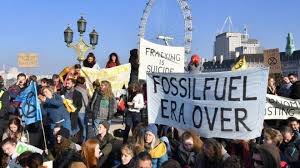In the
stirring chapters of News from Nowhere
devoted to ‘How the Change Came’, the British government makes ‘a desperate
effort to overwhelm “the rebels,” as they were now once more called, and as
indeed they called themselves’. Are the
Extinction Rebellion activists who brought some areas of London to a standstill
this week ‘rebels’ in that sense? What
is the force of their name, what are the aims and means of their protest, what
metaphors and narratives emotionally inspire them?
Suppose we
shifted the purpose of the William Morris Society from reconstruction of the activities
of the socialists of the 1880s and 1890s (to which the current issue of the
Society Journal is partly devoted) to tracking the aims and activities of
progressive moments today, and to eliciting the utopian ‘structures of feeling’
(Raymond Williams’s term) which underpin and inspire their commitment.
But not just tracking and elicting, but actively intervening too. For not once, for example, did we hear the term ‘capitalism’ mentioned in David Attenborough’s splendid climate change television documentary the other night; and nor have I heard it in television and radio coverage of the Extinction Rebellion protests, though of course I’ve not caught all of that. Without a sense of the systemic economic pressures driving us to reckless levels of over-consumption of the earth’s resources, you inevitably fall back – as Attenborough did - on smallscale individual solutions (cycle rather than drive, use less plastic, and so on).
But not just tracking and elicting, but actively intervening too. For not once, for example, did we hear the term ‘capitalism’ mentioned in David Attenborough’s splendid climate change television documentary the other night; and nor have I heard it in television and radio coverage of the Extinction Rebellion protests, though of course I’ve not caught all of that. Without a sense of the systemic economic pressures driving us to reckless levels of over-consumption of the earth’s resources, you inevitably fall back – as Attenborough did - on smallscale individual solutions (cycle rather than drive, use less plastic, and so on).
As E.P.
Thompson and Raymond Williams made so clear, Morris was the great figure who
brought nineteenth-century romanticism into contact with the actual
working-class movement of his time, who, in response to environmental despoliation,
named capitalism as the enemy and communism (exemplified in News from Nowhere) as the solution. The William Morris Society could and should
be an active force promoting that intersection of ‘rebellions’ in today’s
politics too.







3 comments:
With the inspirational activist Greta Thunberg now backing a "general strike" on behalf of the climate, Tony, she does indeed, in that respect at least, resemble Morris's "rebels" in 'News from Nowhere'. For in chapter XVII "people did not need to be told that the GENERAL STRIKE had begun". See https://www.theguardian.com/environment/2019/apr/22/greta-thunberg-backs-general-strike-climate-change-environment
Yes, indeed - thanks. And good to see the Labour Party now backing the protestors: https://www.theguardian.com/environment/2019/apr/23/labour-extinction-rebellion-climate-change
For further thoughts on the environmental general strike idea, see https://www.theguardian.com/commentisfree/2019/apr/24/greta-thunberg-general-strike-action-climate-change
Post a Comment